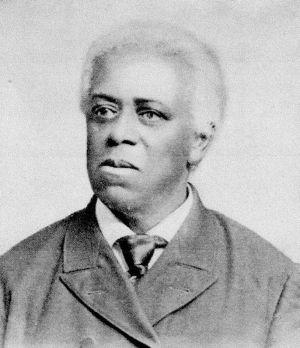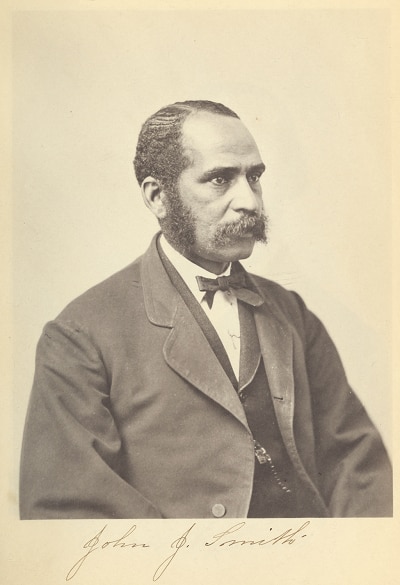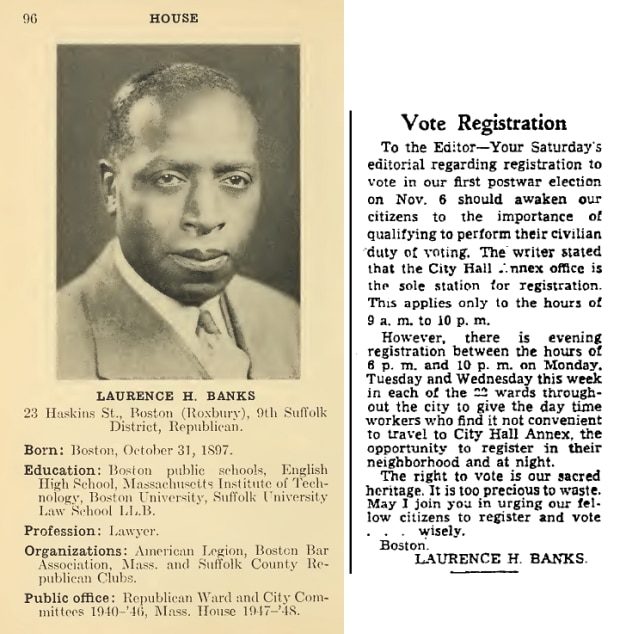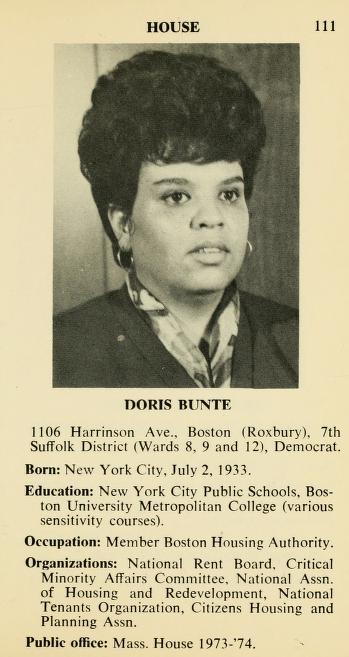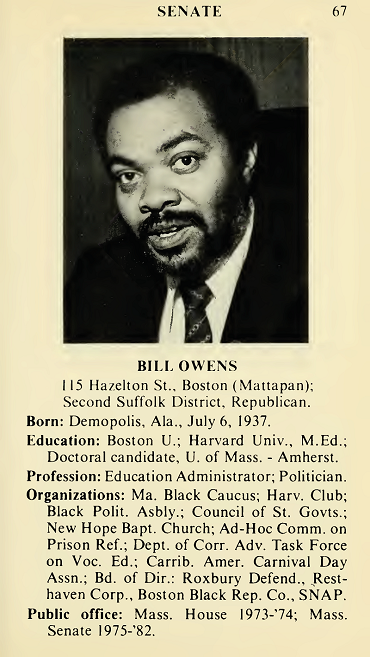Introduction
The story of African American legislators on Beacon Hill is largely the story of Boston and its environment--of the 47 Black legislators elected between 1866 and 2007, only 11 were from districts outside of the Boston city limits, and of these 11, most were from Boston suburbs. In point of fact, a large percentage of African Americans living in Boston resided on the north slope of Beacon Hill during the Reconstruction period (1865-1877).
History of the First African American Legislators in Massachusetts
On November 6, 1866, Massachusetts elected its first two African American members of the Massachusetts General Court: Edward Garrison Walker (also known as Edwin G. Walker), a lawyer from Charlestown, and Charles Lewis Mitchell, a printer from Boston's Ward 6.
Walker was elected in a district that had only three Black voters, while Mitchell's district was the wealthiest ward in the state and had a large number of Black voters. Both men served concurrent one-year terms in the General Court.
Shortly after, John James Smith served in the House of Representatives in 1868, 1869, and 1872, making him the first Black legislator to be elected to more than one term in Massachusetts. While these men paved the way to help other African Americans get elected, they faced many obstacles.
During the post-Reconstruction era white legislators throughout the United States undertook steps to reduce the rights of African Americans. Likewise, the United States Supreme Court decided in Plessy versus Ferguson (1896) that “separate but equal” facilities were not unconstitutional, thus giving legal sanction to Jim Crow segregation laws.
From 1902 until 1947, there was no African American representation in the General Court due to gerrymandering, demographic shifts, and racism. During this time the African American community had strong community leaders that advocated for voter registration, jobs, housing, and political participation for Blacks when there were no elected African American officials in the state.
20th Century: Laurence H. Banks
After a 45 year gap in representation, Laurence H. Banks was elected to serve in the Massachusetts House of Representatives in 1947. Sources show that his political activism started much earlier in his career and his intellect and determination helped him fight for the right to be in office.
In the mid-1900s African American legislators and activists worked to bring racial inequity to the forefront in Massachusetts, targeting specific issues like busing, education inequality, redlining, and labor laws that protected domestic workers, many of whom were immigrants or people of color. Throughout the 1960s and 1970s, more African Americans ran for public office and served in the Massachusetts Legislature.
First Woman Elected: Doris Bunte
Over one hundred years after the first Black man served in the Massachusetts House of Representatives, in 1973 Doris Bunte became the first Black woman to be elected to the Massachusetts legislature.
While in office, Representative Bunte helped form the Massachusetts Black Legislative Caucus (MBLC) and the Massachusetts Caucus of Women Legislators. After spending 12 years as a representative, Doris left the legislature to become the first African American director of the Boston Housing Authority, where she spearheaded efforts to integrate public housing in Boston.
The MBLC took the lessons of history and developed a power base which would make the political and legislative process accountable and accessible to the Black community. Their priority legislation included employment opportunities, Affirmative Action programs, housing, human services, and economic development in the inner cities of Massachusetts. In 2009 the MBLC changed its name to the Massachusetts Black and Latino Legislative Caucus and continues to highlight and analyze those issues and concerns affecting all people of color in the Commonwealth of Massachusetts.
First Senator Elected: Bill Owens
In 1975 another early member of the Black caucus, Bill Owens, was the first African American man elected to the Massachusetts Senate. Senator Owens’s achievements include the creation of the State Office of Minority Business Assistance, Summer Youth Jobs Program, securement of the appropriation for construction of Roxbury Community College, and passage of the Assault Weapons Ban.
While the history of Black legislators in the Commonwealth continues to evolve, there is simply not enough room on this web page to highlight each official and their remarkable stories and achievements, so we hope that this web page offers a portal into the history of African Americans on Beacon Hill with the help of the State Library’s resources.
State Library Collections and Items About African American History
Special Collections
The State Library’s Special Collections department has various collections relating to the history of African Americans in Massachusetts. This department contains newspapers, manuscripts, city directories, photographs and other materials that are very helpful to researchers. For more information, please contact special.collections@mass.gov.
- Colonel Alfred Stedman Hartwell Collection, 1862-2003
- Military Records of the Massachusetts Volunteers
- “The Liberator” Newspaper
- Gloria L. Fox Papers, 1985-2016 (bulk 1999-2013) [At the date of her retirement she is the longest-serving woman in the General Court]
- Bill Owens Papers, 1989-1992
- Memorial to Charles Sumner, Accompanying the Medal Presented by the Government in Behalf of the People of Haiti, May, 1871
- Hope & Glory: the African-American Fight for Freedom in the Civil War: Centennial Celebration of the Monument to Robert Gould Shaw and the 54th Massachusetts Regiment: Boston Common, May 31, 1997
Exhibits
Other State Library Collections Relating to Black History
- Scrapbook of Eugene N. Foss, 1902-1936 (includes mention of African American voters)
- Albert Bushnell Hart Papers, 1911-1941 (includes two folders on African American colonial history)
- Burrill File (includes information on Black legislators and Black Heritage Trail)
- Massachusetts African Americans in the Legislature, in Congress, on the Bench, and with the Executive Council, 1867 to 1969
- Black and Latino Legislators in the Massachusetts General Court: 1867-
Related State Library Blog Posts
- Martin Luther King Jr
Celebrating Martin Luther King, Jr. and his Massachusetts Connection
Acts & Legislative Documents Related to Martin Luther King, Jr.
- 1965 House Bill 3562: Resolutions Inviting Reverend Doctor Martin Luther King to Address a Joint Session of the Legislature
- 1965 House Bill 4155: Address of Reverend Doctor Martin Luther King, Jr. Delivered to a Joint Convention of the Two Houses of the General Court of Massachusetts April 22, 1965
- 1968 House Bill 4199: Resolutions on the Death of the Reverend Martin Luther King
- 1971 Chap. 0069: An Act Relative to the Annual Observance of the Birthday of Martin Luther King, Jr.
- 1974 Chap. 0493: An Act Establishing Martin Luther King's Birthday as a Legal Holiday
- 1985 Chap. 0451: An Act Relative to Celebration of Martin Luther King, Jr.'s Birthday
Contact
Online
Phone
Open M-F 9 a.m.–5 p.m.
Open M-W 9 a.m.–5 p.m. Closed Th-F *Advance appointments highly recommended
